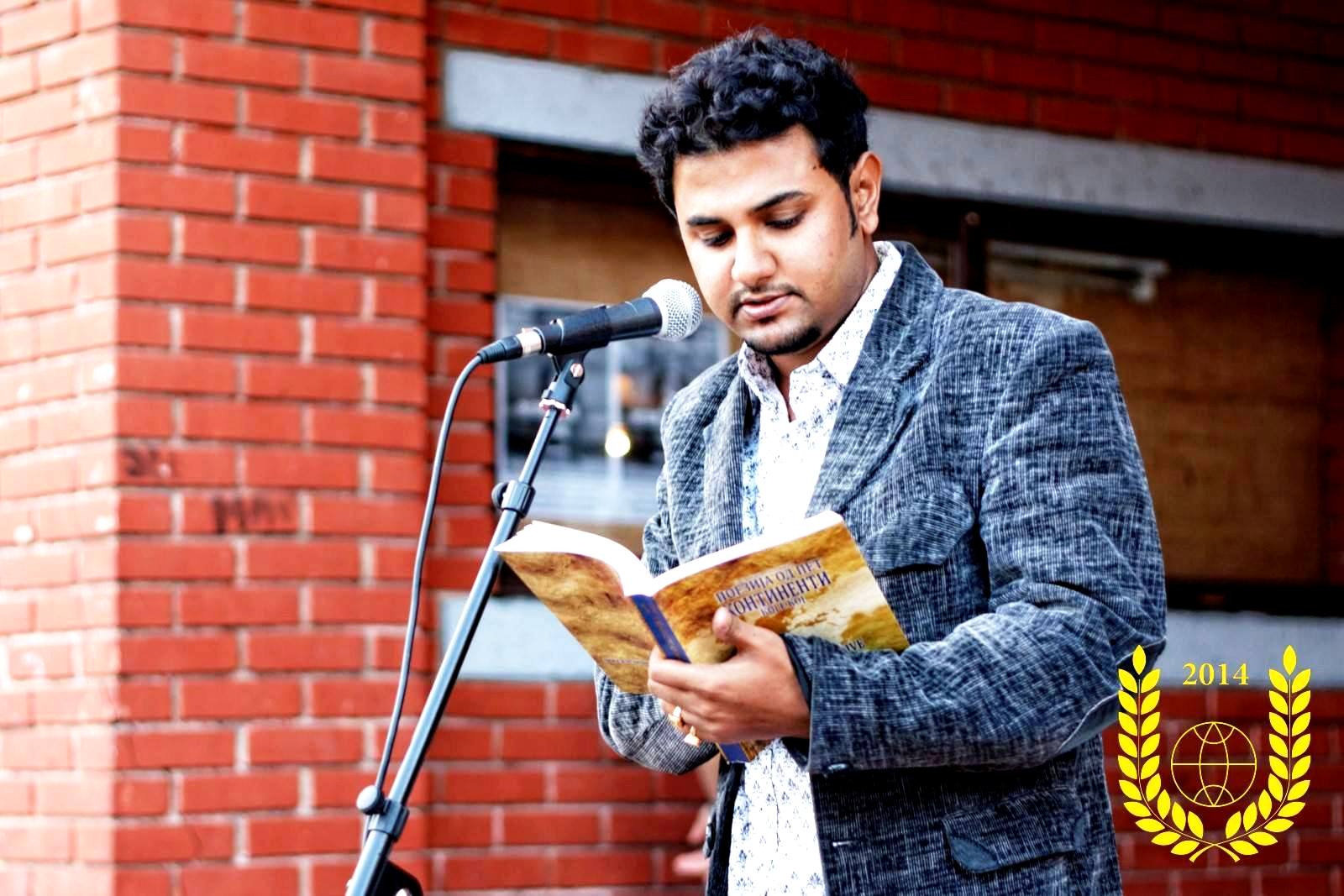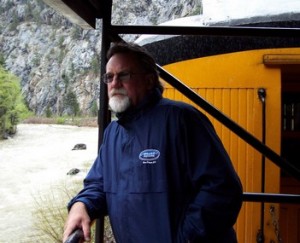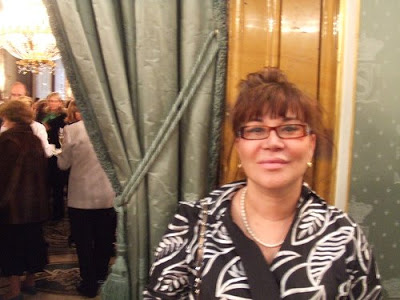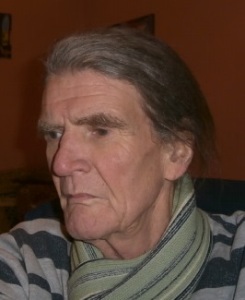Initially the inscription
was thought to be ideograms,
then letters, then some intermediate stage,
insofar as that progression
could be assumed, here. All admired
the whimsical beauty
of the forms, their discipline,
the paradoxical impression
of urgency. Computers
would soon enough resolve
the question and the larger mystery;
but some researchers
perversely wished
the issue could be left
to imagination, their sense
of what had been said.
They questioned if the matrix were, in fact,
cliff, or had once been a wall,
say of a palace. They felt,
given the strangeness, that it hardly mattered
if the obstacles were grit, heat, earthly
distances, or vacuum, cumbersome
suits, hundreds of light years and the problems
of work in vacuum and with so much past.
They wondered if the inscription
had been written by no one
but was itself life carving
itself, and whether they
were both the message and its addressee.

Author of two book-length narrative poems, THE ADVENTURE and HAPPINESS, both published by Story Line Press. A collection of shorter poems, A POVERTY OF WORDS, forthcoming in 2015 from Prolific Press. Has appeared in Hudson Review, Salmagundi, Poetry Salzburg Review, Die Gazette (Munich), The Fish Anthology (Ireland), Representations, Magma (UK), Iota (UK), Bateau, Fulcrum, etc. Online, poems have appeared in Big Bridge, Hamilton Stone Review, Diagram, BlazeVox, The New Hampshire Review, Mudlark, Occupoetry, Faircloth Review, Triggerfish, etc. Adjunct professor creative writing George Washington University.
www.facebook.com/PoetryLifeTimes
www.facebook.com/Artvilla.com
Poem
Kavre. A Poem by Bhuwan Thapaliya
In Kavre,
near the village, ‘Baluwa’,
I heard
the chatter
of young kids
not yet corroded
by the parade of the broken bricks
and the uprooted
roadside metal railings
in the streets of Kathmandu,
as they played
marbles on the buffalo fields.
It was a poem
I’d forgotten.
It was a jingle
not yet crushed
by the voracious jaws
of the bull dozers.
It brought back
in a rush
the Nepal
I’d known:
the rhythm of children
playing in streets
free of the racket,
and danger, of passing trucks.
In Kavre
near the village, ‘Baluwa’,
I heard the song
of life against life.
I sat on the porch
of the old hut
and through
the arched gateway
watched the
wisps of steam float upward
from wiry ferns
to kiss
the cuckoo
birds nest .
•From Bhuwan’s second poetry collection, “ Safa Tempo: Poems New and Selected.”

Bhuwan Thapaliya works as an economist, and is the author of four poetry collections. Thapaliya’s books include the recently released Safa Tempo: Poems New and Selected (Nirala Publication, New Delhi), and Our Nepal, Our Pride (Cyberwit.net). Poetry by Thapaliya has been included in The New Pleiades Anthology of Poetry and Tonight: An Anthology of World Love Poetry, as well as in literary journals such as Urhalpool, MahMag, Kritya, FOLLY, The Vallance Review, Nuvein Magazine, Foundling Review, Poetry Life and Times, Poets Against the War, Voices in Wartime, Taj Mahal Review, and more.
Author
Amazon.com/Our Nepal Pride Bhuwan Thapaliya
robin@artvilla.com
www.facebook.com/PoetryLifeTimes
Enigmatic Winds. A Poem by Sonnet Mondal
Enigmatic winds
curl up into fragments of breezes
drilling into the death of winter
embracing the hologram of breathing sand.
River beds,
as they embark
upon the edges of southern winds
and Conifers scream their complaints from the north,
focus of life desolately oscillates
as a beacon from light houses
with paws of the carrier Griffin
proceeding in the shades,
improvising posthumous caveats
popping up as robot heads of night guards.
Pages of an expedition
crumble beneath old pirate-ships
(roaming in a nomadic famine struck by avarice)
fall in and spread again
upon the cushion of rootless waters
led by enigmatic winds
in unfolded folds of untold tales.
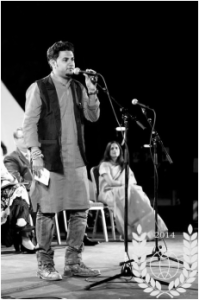
Sonnet Mondal is an Indian poet of the twenty first century generation and has authored eight collections of poetry. He was featured as one of the Famous Five of Bengali youths by India Today magazine in 2010 and has edited & written forewords of several books of Indian poets. His works have appeared in several international literary publications including The Sheepshead Review (University of Wisconsin, Green Bay), The Penguin Review (Youngstown State University), Two Thirds North (Stockholm University), Fox Chase Review, The Stremez (Supported by The Ministry of Culture, Macedonia), California State Poetry Quarterly (California State Poetry Society), Nth Position, Dark Matter Journal(University of Houston-Downtown) and Friction Magazine (New Castle University & New Castle Centre of Literary Arts) to name a few.
He has been Writer of The Month at the Spark Magazine in June 2012, was featured as an achiever in The Herald of India in 2010 & featured in E-view points in Rockfordkingsley ltd. in 2012 and was a featured poet at Tea with George at Desperanto Publication Ltd. (now defunct).
His works have been translated in Macedonian, Italian, Albanian, Urdu, Arabic, Hindi, Telugu and Bengali.
He is the Editor in Chief of The Enchanting Verses Literary Review and Editorial Board member of Multilingual Magazine Levure littéraire based in Paris, France. Details of his works can be found at www.sonnetmondal.com
www.facebook.com/PoetryLifeTimes
www.facebook.com/Artvilla.com
For Olga. A Poem by Blanca Andreu. Translated from Spanish by Robin Ouzman Hislop & Amparo Arrospide.
This work comprises in an excerpt from the anthology on contemporary Spanish female poets entitled Las Diosas Blancas. Madrid, 1985. Copyright Ed. Ramon Buenaventura. Hiperion. This is an original and unpublished English version of the original poem written in Spanish. Translators Robin Ouzman Hislop and Amparo Arrospide would like to thank Casa del Traductor, in Tarazona and the British Literary Translation Association, East Anglia University Campus.
From this Spanish anthology –compiled by the well-known scholar and translator Mr. Ramón Buenaventura, whom we contacted earlier– a few selected authors were chosen for our joint translation work: Amalia Iglesias: Te buscare para decirte (I Will Find You To Tell You) , Ana Rossetti: Triunfo de Artemis sobre Volupta (Triumph Of Artemis Over Volupta) and Isolda (Isolda) , Blanca Andreu: Para Olga (For Olga) , Isla Correyero: Los Pajaros (Small Birds), Amparo Amoros: Midas (Midas) and Criaturas del gozo (Creatures Of Joy) , Rosalia Vallejo: Horno en llamarada (A Furnace In Flames) , Maria del Carmen Pallares: Sisargas (Sisargas), Margarita Arroyo: Era el mar lejos del mar ( It Was Sea Away From Sea).
We would like to thank Mr. Ramón Buenaventura and the above name poets, in advance, and let them rest assured that their work is protected by a legal Creative Commons Licence, by virtue of which the above named translators are willing to provide excerpts from their original translation work, provided that readers agree to use it under the terms of such licence. We strongly recommend reading the entire work and the poets’, who have continued evolving during these decades.
For Olga
Girl of delicately golden tresses,
girl obsession of the virgin stork
with tufts of damask feathers
that splashed death,
of the crazy stork with wings
of golden strychnine
which flew off leaving you with a corporeal perfume,
a neat smell of lilacs, already golden and rude dreams.
Girl who obeyed the apostle scops owl
and the murky look of real eyes,
with puerile drawings of Selene and the rest.
Girl of non-existent concert,
girl of cruel sonatines and malevolent books by Tom Wolfe,
or witch lace to bandage wounded deer ulcers,
of fallow deer gazing from mystical knolls,
or places like that.
Pluperfect girl, girl we never were,
tell it now,
tell it now, you, now that it’s so late,
spell out the sombre tempo,
spell me the tear
the purple silhouette of the mare,
the foal that lay at your feet waking up foam.
Abandoned recite the words of yesteryear,
shadow of Juan Ramón: Solitude, I am true to you.
Scornful recite the words of yesteryear,
but not that courtly verse,
don’t talk of queens white as a lily,
snow and Joan burning
and interwoven melancholy
of dear Villon,
speak clear verbs where you can drink the saddest liquid,
jars of sea and relief, now that it is already so late,
raise your tiny voice and summon up the song:
tell life that I remember her,
I remember her.
This small death is definitely lost in a nascent forest,
the shoot of an arrested comet,
that nobody saves
young volcano of novice gust and bones
made of bird, eyelid and thinking wave
that no stella book
no book painted with Italien solar gold,
no book of lava
will seal for me.
And so death so many times written
becomes radiant,
and i can talk
of desire and the unseeing beam of the lighthouse,
of the chimerical corpse of the crew.
And so death
becomes the story
of that mute girl who hanged herself
with boreal harp’s strings
because of nuptial poison on her tongue.
I definitely get lost cradling litters of rare epitaphs,
girl of golden tresses,
I will tell life that you remember her,
I will tell death that you remember her
that you remember their lines conjuring your shadow,
that you remember their habits and tempo solo,
bitter laurel, deep bramble, brazen error and sorrowful hordes,
while Ephesian cats are crying at my feet,
while lost silver cats
go curdling their ancestry in genealogical cypress and poplar,
I will tell life to remember you,
to remember me
now,
when I rise with loops and hair strings
up to the disaster of my head
up to the disaster of my twenty years,
up to the disaster, lammergeier light.
De una niña de provincias que se vino a vivir en un Chagall, 1980
Para Olga
Niña de greyes delicadamente doradas,
niña obsesión de la cigüeña virgen
con mechones de plumas de damasco
que salpicaban muerte,
de la cigüeña loca con alones
de estricnina dorada
que viajaba dejándote un corpóreo perfume,
un pulcro olor a lilas, ya dorados y rudos sueños.
Niña que obedeció al autillo apóstol
y a la mirada turbia de los ojos reales,
con pueriles dibujos de Selene y demás.
Niña de inexistente concierto,
niña de crueles sonatinas y malévolos libros de Tom Wolfe,
o de encajes de brujas para vendar las llagas de los corzos heridos,
de ciervos vulnerados asomados en los oteros místicos,
en los sitios así.
Niña pluscuamperfecta, niña que nunca fuimos,
dilo ahora,
dilo ahora tú, ahora que es tan tarde,
pronuncia el torvo adagio,
pronúnciame la lágrima,
la silueta morada de la yegua,
la del potro que se tendió a tus pies despertando la espuma.
Declama abandonada las palabras de antaño,
sombra de Juan Ramón: Soledad, te soy fiel.
Declama desdeñosa las palabras de antaño,
pero no aquella estrofa cortesana,
no hables de reinas blancas como un lirio,
nieves y Juana ardiendo,
y la melancolía entretejida
del querido Villon,
sino los verbos claros donde poder beber el líquido más triste,
jarros de mar y alivio, ahora que ya es tarde,
alza párvula voz y eco albacea y canta:
Dile a la vida que la recuerdo,
que la recuerdo.
Definitivamente se extravía en un bosque naciente esta muerte pequeña,
el brote del cometa detenido,
esto que nadie salva,
joven volcán de huesos y ráfaga novicia
hecha de pájaro y de párpado y de ola pensante
que ningún libro estela,
ningún libro estofado de oro solar de Italia,
ningún libro de lava
viene a sellar por mí.
Y así la muerte tantas veces escrita
se me vuelve radiante,
y puedo hablar
del deseo y del lacre rubio y ciego en los faros,
del cadáver quimera de la tripulación.
Y así la muerte
se convierte en historia
de aquella niña muda que se ahorcó
con las cuerdas boreales del arpa
porque tenía en la lengua un veneno nupcial.
Definitivamente me extravío acunando camadas de raros epitafios,
niña de grey dorada,
diré a la vida que la recuerdas,
diré a la muerte que la recuerdas,
que recuerdas sus líneas conjurando tu sombra,
que recuerdas sus hábitos y su carácter solo,
su laurel ácido, su profunda zarza, su descarado error y sus hordas dolidas,
mientras gatos efesios van llorando a mis pies,
mientras gatas perdidas plateadas
van cuajando su alcurnia en ciprés genealógico y en álamo,
diré a la vida que te recuerde,
que me recuerde,
ahora,
cuando me alzo con cuerdas capilares y bucles
hasta el desastre de mi cabeza,
hasta el desastre de mis veinte años,
hasta el desastre, luz quebrantahuesos.
“De una niña de provincias que se vino a vivir en un Chagall”1980
AUTHOR: BLANCA ANDREU (1959)
Bibliography:
– De una niña de provincias que se vino a vivir en un Chagall (awarded the 1980 Adonais International Poetry Prize) (Ediciones Rialp, Madrid, 1981).
– Báculo de Babel (awarded the Fernando Rielo International Poetry Prize) (Hiperión, Madrid, 1983).
– Elphistone (Visor Libros, Madrid, 1988)
– El sueño oscuro: (poesía reunida, 1980-1989) (Hiperión, Madrid, 1994).

Blanca Andreu (born 1959 A Coruña) is a Spanish poet. She grew up in Orihuela, where her family still resides, and attended El Colegio de Jesus-Maria de San Agustin, followed by studies in philology in Murcia. At age 20, she moved to Madrid without formally completing her education. Here, she met Francisco Umbral, who introduced her to the literati of the city.
In 1980, she was awarded the Premio Adonáis de Poesía for her work entitled, De una niña de provincias que se vino a vivir en un Chagall. Her use of surrealism is considered the beginning of the Post-Modern Generation. Her later work has tried to shy away from the surrealist tendencies of her early pieces.[2]
In 1985, she married novelist Juan Benet. After he died in 1993, she returned to La Coruña where she now lives a semi-reclusive life.
Awards
1980: Premio Adonáis de Poesía
1981: Premio de Cuentos Gabriel Miró
1982: Premio Mundial de Poesía Mística, Fernando Rielo
1982: Premio Ícaro de Literatura
2001: Premio Internacional de Poesía Laureà Mela
Translators:
Amparo Arrospide (Argentina) is a poet and translator. She has published seven poetry collections, Mosaicos bajo la hiedra, Alucinación en dos actos y algunos poemas, Pañuelos de usar y tirar, Presencia en el Misterio, En el Oido del Viento, Hormigas en Diáspora , Jaccuzzi, and Valle Tiétar, as well as poems, short stories and articles on literary and film criticism in anthologies and in both national and foreign magazines. She has received numerous awards.
Robin Ouzman Hislop is Editor of Poetry Life and Times ; his publications include
All the Babble of the Souk , Cartoon Molecules and Next Arrivals, collected poems, as well as translation of Guadalupe Grande´s La llave de niebla, as Key of Mist and the recently published Tesserae , a translation of Carmen Crespo´s Teselas.
You may visit Aquillrelle.com/Author Robin Ouzman Hislop about author. See Robin performing his work Performance (University of Leeds)
Editor’s Note: see also Poetry, National Literature Prize 2018, Francisca Aguirre, Translated from Spanish by Amparo Arróspide & Robin Ouzman Hislop
RUSHING TO THE METRO ALREADY A LITTLE LATE ON MY WAY TO BALLET I NEARLY SKID ON ACORNS, CATCH MYSELF. A Poem by Lyn Lifshin
Introduction:
Malala Yousafzai is a teenager from the town of Mingora in the Swat District of Pakistan’s Khyber Pakhtunkhwa province, where the Taliban banned girls from attending school. Known for her education and women’s rights activism, Malala, then fifteen, was shot in the head and neck by a Taliban gunman while returning home on a school bus on October 9, 2012. She survived. She has written an autobiography, I Am Malala: The Girl Who Stood Up for Education and Was Shot by the Taliban. In 2013, at sixteen, she became the youngest person ever nominated for the Nobel Peace Prize. and this year she won it.
Malala
RUSHING TO THE METRO ALREADY A LITTLE LATE ON MY WAY TO BALLET I NEARLY SKID ON ACORNS, CATCH MYSELF
I think of Malala, maybe rushing, never
wanting to think her name means “grief
stricken,” as I’ve written a poem about
becoming what you’re called. Maybe
she was humming a song she heard once
on TV before the Taliban made it a crime.
Or she was watching leaves drift from the bus
or giggling with girl friends. Maybe
she was thinking of being a doctor and
coming back to treat young children
in her region, her swat. Or maybe she
was hoping to see a certain boy with
licorice eyes and a smile who always
made her giggle. No longer able to wear
school uniforms, told to wear plain
clothes, Malala wrote in her blog,
“Instead, I decided to wear my favorite
pink dress.” Maybe the last beautiful
thing she saw as the bullet entered her
mahogany curls until later she woke
up in the hospital’s cone of light.
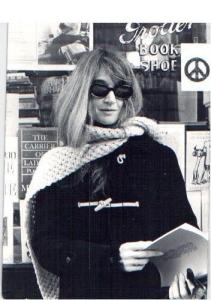
Lyn Lifshin has published over 140 books and chapbooks and edited three anthologies of women’s writing including Tangled Vines that stayed in print 20 years. She has several books from Black Sparrow books. Her web site, www.lynlifshin.com shows the variety of her work from the equine books, The Licorice Daughter: My Year with Ruffian and Barbaro: Beyond Brokenness to recent books about dance: Ballroom, Knife Edge and Absinthe: The Tango Poems. Other new books include For the Roses, poems for Joni Mitchell, All The Poets Who Touched Me; A Girl goes Into The Woods; Malala, Tangled as the Alphabet: The Istanbul Poems. Also just out: Secretariat: The Red Freak, The Miracle; Malala and Luminous Women: Enheducanna, Scheherazade and Nefertiti. web site: www.lynlifshin.com
www.facebook.com/PoetryLifeTimes
www.facebook.com/Artvilla.com
robin@artvilla.com
editor@artvilla.com
I punk like for real. A Poem by Miriam C. Jacobs.
where them tights with the hole? this skirt
too toile. someone might think I effort,
tangle hair on purpose. no one even know
I wake up like six thirty bank account got money.
tuck it in before I get mistake.
your eyes, they tiny round and silver like eyes
one of those dolls people stick over the toilet paper way back
in the fifties before I was born you better believe
it. I seen those old, old movie. those hippie. them trailer-park
grandma face tape. I put my birt-tay right in my email.
mother fucker don’t tell me it’s semantics.
you got great big hair pony over your bald spot.
you camouflage, but I still recognize you, saggy
chin since you got marry, little soft
under arm. me, I stay single cinder-block bookcase
paint up myself, Goodwill cup, so much cooler than you.
we sit on the floor, make Kaballah and stuff.
my hip don’t hurt at all.
how about I wear little green dress linen always look wrinkle?
anyone can see I try (not), I care (not).
I forget what you even said when you came over

MIRIAM C. JACOBS is a alumnus of the University of Chicago and teaches college writing, literature and humanities. Jacobs is the editor of Eyedrum Periodically, the art/literature journal of Eyedrum Art & Music Gallery, Atlanta. Her poetry has appeared in Jewish Literary Journal, The East Coast Literary Review, Record Magazine, The Camel Saloon, Bluestem: the Art and Literary Journal of Eastern Illinois University, The King’s English, and Oklahoma Today, among other publications. Her chapbook of poetry, The Naked Prince, was published by Fort!/Da? Books in September 2013.
www.facebook.com/PoetryLifeTimes
www.facebook.com/Artvilla.com
when the rich rays of morning lessen . A Poem by Richard Lloyd Cederberg
“It belongs to the imperfection of everything human that
man can only attain his desire by passing through its opposite”… Soren Kierkegaard
__________________________________
Today an unhappy spirit questioned-
Despite what beneficial
Environs exist
Along a souls river,
Where flora could flourish
In nutrient rich soil- why some
Gardens exsiccate and become more
Blanched than bone dust…
~
With little
Comprehension
Vanity stared into the
Mirrored gray-blue water and demanded,
“Why is it so many never take root? Tell me, please,
Would you, where they go; dreams that perish?”
~
But there was
Little discernible today,
In any way,
No kindly wisdom,
No revelation or sound, save a
Sudden splash as a solitary seagull alighted
(a smooth reflected surface) and began
Pecking flesh from a lifeless trout
August 2007 Richard was nominated for a 2008 PUSHCART PRIZE. Richard was awarded 2007 BEST NEW FICTION at CST for his first three novels and also 2006 WRITER OF THE YEAR @thewritingforum.net … Richard has been a featured Poet on Poetry Life and Times Aug/Sept 2008, Jan 2013, Aug 2013, and Oct 2013 and has been published in varied anthologies, compendiums, and e-zines. Richard’s literary work is currently in over 35,000 data bases and outlets. Richard’s novels include: A Monumental Journey… In Search of the First Tribe… The Underground River… Beyond Understanding. A new novel, Between the Cracks, was completed March 2014 and will be available summer 2014.
Richard has been privileged to travel extensively throughout the USA, the provinces of British Columbia, Manitoba, Alberta, and Saskatchewan in Canada, the Yukon Territories, Kodiak Island, Ketchikan, Juneau, Skagway, Sitka, Petersburg, Glacier Bay, in Alaska, the Azorean Archipelagoes, and throughout Germany, Switzerland, Spain, and Holland… Richard and his wife, Michele, have been avid adventurers and, when time permits, still enjoy exploring the Laguna Mountains, the Cuyamaca Mountains, the High Deserts in Southern California, the Eastern Sierra’s, the Dixie National Forest, the Northern California and Southern Oregon coastlines, and the “Four Corners” region of the United States.
Richard designed, constructed, and operated a MIDI Digital Recording Studio – TAYLOR and GRACE – from 1995 – 2002. For seven years he diligently fulfilled his own musical visions and those of others. Richard personally composed, and multi-track recorded, over 500 compositions during this time and has two completed CD’s to his personal credit: WHAT LOVE HAS DONE and THE PATH. Both albums were mixed and mastered by Steve Wetherbee, founder of Golden Track Studios in San Diego, California.
Richard retired from music after performing professionally for fifteen years and seven years of recording studio explorations. He works, now, at one of San Diego’s premier historical sites, as a Superintendent. Richard is also a carpenter and a collector of classic books, and books long out of print.
www.facebook.com/PoetryLifeTimes
www.facebook.com/Artvilla.com
Small Birds.(Los Pajaros). A Poem by Isla Correyero. Translated by Robin Ouzman Hislop & Amparo Arrospide
This work comprises in an excerpt from the anthology on contemporary Spanish female poets entitled Las Diosas Blancas. Madrid, 1985. Copyright Ed. Ramon Buenaventura. Hiperion. This is an original and unpublished English version of the original poem written in Spanish. Translators Robin Ouzman Hislop and Amparo Arrospide would like to thank Casa del Traductor, in Tarazona and the British Literary Translation Association, East Anglia University Campus.
From this Spanish anthology –compiled by the well-known scholar and translator Mr. Ramón Buenaventura, whom we contacted earlier– a few selected authors were chosen for our joint translation work: Amalia Iglesias: Te buscare para decirte (I Will Find You To Tell You) , Ana Rossetti: Triunfo de Artemis sobre Volupta (Triumph Of Artemis Over Volupta) and Isolda (Isolda) , Blanca Andreu: Para Olga (For Olga) ,Isla Correyero: Los Pajaros (Small Birds) , Amparo Amoros: Midas (Midas) and Criaturas del gozo (Creatures Of Joy) , Rosalia Vallejo: Horno en llamarada (A Furnace In Flames) , Maria del Carmen Pallares: Sisargas (Sisargas) , Margarita Arroyo: Era el mar lejos del mar ( It Was Sea Away From Sea).
We would like to thank Mr. Ramón Buenaventura and the above name poets, in advance, and let them rest assured that their work is protected by a legal Creative Commons Licence, by virtue of which the above named translators are willing to provide excerpts from their original translation work, provided that readers agree to use it under the terms of such licence. We strongly recommend reading the entire work and the poets’, who have continued evolving during these decades.
My consciousness rests upon the fifth stair of your agony.
Asleep in my eyes are two small proud birds.
I have just painted my whole face red and afterwards burnt it.
My hair hangs in salt crystals and tufts of cotton wool.
You are naked before me. I am lying to you.
I am naked before you, an untouched white blossoming virgin.
A shaded grove and snowy whiteness envelope us.
A hollow gorge is piled with pearls and medusas and cast out eyes of fish.
There are mutilated children afloat in the bathing pools of Ariadne’s
estate, yellow sandals and birch branches.
Sanskrit scrolls are floating across the Ross Sea
together with the remains of cetaceans and sea elephants.
Those goats that penetrated the galleon’s cabin
I know will die.
Five pirates wearing brass studs in their cheekbones, ready-made
amulets, dried blood of dogs and bison.
I thirst. It seems as though I am dead.
From the mortuary emerges a giant flask of whisky laden in grapefruit. A
small girl walks behind the catafalque, naked and
she lies. Into an urn her hands contain falls a drop of amber.
Pages of paper ferment in rainfalls. There are scars of ice
over each word.
Asleep in my eyes are two small proud birds.
Waters flow from my hands to make streaks in the dust; loaves
of mica lay a vault to my solitary ancientness.
Sunlight bursts a bubble and gathers herbs from the landscape.
Out of the desert came a caravan of the demented who handed
over its prisoners to the vultures, left now to grow
beards and at dawn depart for the Pole.
Outside my door are the goats they left behind. They lie on
the floor quartered and covered in honey.
Close to the beach a fisherman has furtively caught a bear cub,
and whilst it yet lives, devours its flesh, raw.
Other birds have come to my eyes.
On lavatory walls are seen images of the passion according to Mathew.
In chestnut boughs, at peace now, the spirit of the Melchite
roams, a gypsy without teeth.
In a silver milk jug the right hand of the Margot
is submerged in milk.
The oldest house in the village has burnt down. Fire is
arrogant and consoling.
The following day ashes were mixed with geraniums and hairs
of the ancient crone.
You are still naked before me. You are weeping.
I am still naked before you, I don’t lie, now.
Ashes fall from my face to yours and I repeat in-
comprehensibly: The small proud birds are dead
in my eyes. The small proud birds.
My consciousness is on the fifth stair of your agony.
In my eyes are all the watchful small proud birds of the earth.
AUTHOR: ISLA CORREYERO (1957)
Bibliography:
– Cráter (Provincia, Colección de Poesía, León, 1984)
– Lianas (Hiperión, Madrid, 1988).
– Crímenes (Ediciones Libertarias, Madrid, 1993)
– Diario de una enfermera (Huerga y Fierro Editores, Madrid, 1996)
– La pasión (ExLibris Ediciones, 1998)
– Feroces (DVD, Barcelona, 1998)
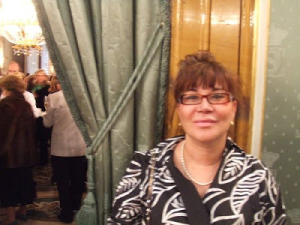
Isla Correyero was born in Extremadura and lived in various Spanish towns and cities, since the age of 16 she has lived in Madrid. She studied Dance, Information Sciences and Child Care and currently works as coordinator of screenplays and TV. Her Poetry publications are: Cráter, 1984, Colección provincia , León. Lianas , 1988, Hiperion, Madrid. Crímenes, 1993, Libertarias, Madrid. Diario de una enfermera,(Premio Ciudad de Córdoba 1997), Huerga y Fierro, Madrid. La Pasión, Finalista Premio Poesía Mística Fernano Rielo 1998. Ex – Libris Amor tirano, Premio Hermanos Argensola 2002 DVD , Barcelona. – She edited the well known anthology Feroces. 1998 DVD, Barcelona, and was herself included in anthologies such as Las diosas blancas, Hiperion. She has given recitals and taught poetry workshops in Spain, Venezuela, Ecuador, Argentina, Canada and the Netherlands. She has 4 unpublished books. One is an opera, Divorcio, which was performed at the University of Salamanca in 2013. Recently she created her own publishing company, Inspirar Expirar.
Isla Correyero nació en Extremadura. Ha vivido en pueblos y distintas ciudades españolas. Desde los 16 años vive en Madrid. Cursó estudios de Danza, Ciencias de la información y Puericultura. Actualmente trabaja como coordinadora de guiones de cine y TV , aunque su gran trabajo y pasión es la Poesía. En el año 2000 le fue concedida la Medalla de Honor de su Colegio Mayor Universitario Isabel de España, Madrid. Publicaciones poéticas : Cráter, 1984, Colección provincia , León. Lianas , 1988, Hiperion, Madrid. Crímenes, 1993, Libertarias, Madrid Diario de una enfermera, premio ciudad de Córdoba 1997 , Huerga y Fierro, Madrid. La Pasión, Finalista premio poesía mística Fernano Rielo 1998. Ex – Libris Amor tirano, Premio Hermanos Argensola 2002 DVD , Barcelona. – Es la autora de la antología Feroces. 1998 DVD, Barcelona. Ha publicado diversas plaquettes. Ha sido antologada, entre otras, en Las diosas blancas, Hiperion y Ellas tienen la palabra, Hiperion. Ha dado recitales e impartido talleres de poesía en España, Venezuela, Ecuador, Argentina, Canadá y Holanda. Por variadas causas editoriales no ha publicado en estos once últimos años. Tiene 4 libros inéditos. Uno de ellos es una ópera, Divorcio (Hoz en la espalda), que se representó coralmente en el teatro Juan Del Enzina, de la Universidad de Salamanca 2013 Una de las razones fundamentales por las que ha decidido crear su propio sello editorial, Inspirar Expirar ediciones, autopublicándose exten-samente. Así como para poder publicar a otros poetas de su gusto y ética.
Robin Ouzman Hislop Editor of the 12 year running on line monthly poetry journal Poetry Life and Times. (See its Wikipedia entry at Poetry Life and Times). He has made many appearances over the last years in the quarterly journals Canadian Zen Haiku, including In the Spotlight Winter 2010 & Sonnetto Poesia. Previously published in international magazines, his recent publications include Voices without Borders Volume 1 (USA), Cold Mountain Review, Appalachian University N Carolina, Post Hoc installed at Bank Street Arts Centre, Sheffield (UK), Uroborus Journal, 2011-2012 (Sheffield, UK), The Poetic Bond II & 111, available at The Poetic Bond and Phoenix Rising from the Ashes a recently published Anthology of Sonnets: Phoenix Rising from the Ashes. He has recently completed a volume of poetry, The World at Large, for future publication. He is currently resident in Spain engaged in poetry translation projects.
robin@artvilla.com
PoetryLifeTimes
Poetry Life & Times
editor@artvilla.com
www.artvilla.com
Artvilla.com

